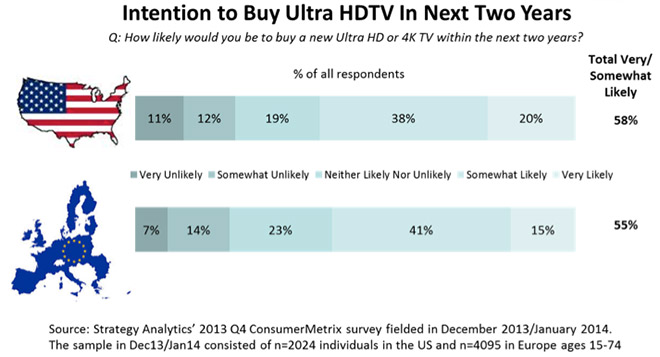Europe's online source of news, data & analysis for professionals involved in packaged media and new delivery technologies
55% of Europeans would buy Ultra HDTV

Following his post from CES back in January, DAVID MERCER, Principal Analyst at Strategy Analytics, says that more positive news for UHD TV emerges after they have completed the weighting of the latest European survey data in the firm's ConsumerMetrix service.
As in the US we found strong interest in buying a new UHD TV over the next two years, assuming the products meet performance and price expectations. 55% of Europeans said they would be very or somewhat likely to buy a UHD TV over the coming two years, split between 15% very and 41% somewhat likely (difference due to rounding).
As I noted previously, the survey question asked respondents to make certain assumptions: Ultra HD or 4k TV is a new type of TV which offers significantly improved images compared to today's HDTV. Assuming the price of an Ultra HD or 4k TV was acceptable to you, and assuming the image quality was as good as is claimed, how likely would you be to buy a new Ultra HD or 4k TV within the next two years?
Some commentators questionned our approach, but we feel it is justified to ask consumers to make assumptions about things they are not familiar with. At minimum this research demonstrates that people are indeed interested in improving their big screen TV experience, even when they already have HD. This is an important finding in itself, given that there seem to be many observers doubting the need for Ultra HD or indeed the future importance of the big screen in the home in general.
Our study also reached the following conclusions:
- Awareness of the term 'Ultra HD' is much higher than either '4K TV' or 'UHD'
- Awareness of Ultra HD declines with age and increases with income
- Two thirds of higher income households would be willing to buy an Ultra HDTV
- Intention to buy Ultra HDTV peaks in the 25-34 age group
- Other indicators of intention to buy Ultra HDTV are number of children in the household and ownership of surround sound systems.

Contact: www.strategyanalytics.com.
...
On predicting the future

Predicting the future, let alone the future of packaged media, is a perilous exercise, and possibly counter-productive, as the exercise closes doors rather than keep them open, argues JEAN-LUC RENAUD, DVD Intelligence publisher. Consider that: Apple was left nearly for dead 15 years ago. Today, it became the world's most valuable technology company, topping Microsoft.
Le cinéma est une invention sans avenir (the cinema is an invention without any future) famously claimed the Lumière Brothers some 120 years ago. Well. The cinématographe grew into a big business, even bigger in times of economic crisis when people have little money to spend on any other business.
The advent of radio, then television, was to kill the cinema. With a plethora of digital TV channels, a huge DVD market, a wealth of online delivery options, a massive counterfeit underworld and illegal downloading on a large scale, cinema box office last year broke records!
The telephone was said to have no future when it came about. Today, 5 billion handsets are in use worldwide. People prioritize mobile phones over drinking water in many Third World countries.
No-one predicted the arrival of the iPod only one year before it broke loose in an unsuspecting market. Even fewer predicted it was going to revolutionise the economics of music distribution. Likewise, no-one saw the iPhone coming and even fewer forecast the birth of the developers' industry it ignited. And it changed the concept of mobile phone.
Make no mistake, the iPad will have a profound impact on the publishing world. It will bring new players, and smaller, perhaps more creative content creators.
And who predicted the revival of vinyl?
(click to continue)... Read More...



















